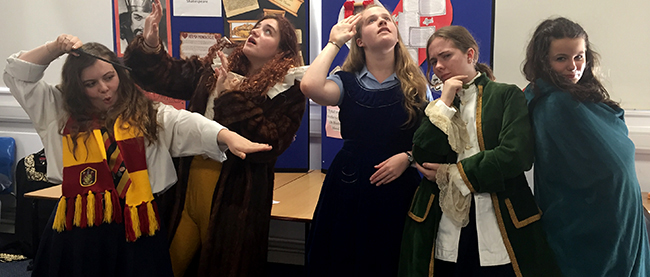Current Teaching Staff:
Mrs C Peake - Head of Department
Mrs H Baker-Thornton, Ms T Banks, Mrs A Beal, Miss S Cross, Mrs R Gorrin, Ms C Jenkins
Curriculum Intent:
Our English curriculum aims to help students become confident communicators who have their own ‘voice’, think critically and write with creative flair.
By providing them with opportunities to engage with a diverse range of texts, we encourage students to question the world around them, developing empathy and open-mindedness as well as fostering a love of literature.
Subject Overview
Students follow a programme designed to inspire passion and enthusiasm in the three key areas of English: reading, writing, speaking and listening. We study a diverse range of texts including novels, poetry, drama including plays by Shakespeare, and modern media texts.
Classroom approaches are active and lively, enabling students to develop critical and creative responses and supporting them to become independent learners. Pupils are often given the opportunity to visit the library where they learn how to effectively use materials for research and are encouraged to read widely and for pleasure.
Where possible, visits to the theatre are arranged so that students can see the plays they are studying in performance to enrich their learning including visits to see performances by the Royal Shakespeare Company and visits to school by Quantum Theatre Group. Also, extra-curricular opportunities such as Book Club, Creative Writing Club and Murder Mystery Group and competitions such as 500 words offer students the chance to pursue their passions and be creative.
SMSC
The nature of English means that we are constantly considering content that raises ethical, moral and social questions that we encourage pupils to consider. Pupils are encouraged to question sources and understand others’ perspectives, building empathy and forming their own opinions which they then need to articulate sensitively.
British Values
We look at texts that cover a diverse range of opinions and experiences and understand how historical and social context can influence and impact a text and how and why these attitudes have changed over time.
From our study of Shakespearean England in the 16th and 17th centuries, Romantic poets and the impact of the Industrial Revolution to Modern Britain, the impact of conflict and world wars and the impact of technology on how we communicate in the 21st century; we allow pupils to experience the full spectrum of the English Canon as well as understanding how and why some voices, such as those of women and non-white authors, have been marginalised and how literature in modern Britain is as diverse as the society it represents.
Reading
Pupils are encouraged to read broadly. To read texts from a range of historical and cultural contexts, to challenge our own ideas and to broaden our horizons. Pupils read a range of genres and a range of voices and, in doing so, build a love of literature and skills to read a range of texts that support their skills across the curriculum.
Oracy
Pupils frequently visit the library and are provided the opportunity to discuss their independent reading with peers, participate in shared reading looking at diverse and challenging texts that aim to expand their reading horizons and enjoy activities designed to foster a culture of reading such as World Book Day and events such as Black History Month authors and Pride Month LGBTQ narratives.
Careers
Studying English equips you with a broad range of skills that can be applied to many jobs and career paths. We develop skills in
- Research methods
- Critical thinking and analysis
- Verbal and presentation skills
- Constructing arguments
- Participating in and leading discussions
- Writing and storytelling
- Creative thinking and problem solving
We emphasise that English is the key to success in all subjects and is valued in careers as diverse as Medicine to Law, journalism, HR and in the Media.
Character skills
English offers a range of leadership opportunities, from leading group work, class discussions and projects, to wider roles within the department as subject ambassadors, leading clubs and supporting as reading and writing mentors.
Pupils are encouraged to think logically, listening to others, considering ideas before forming their own opinions and articulating their perspectives clearly and sensitively.
We encourage creativity, offering opportunities for drama, poetry, creative writing and debate, as well as encouraging pupils to mix media and draw on their knowledge from outside of the subject to enrich their learning (some even make cakes inspired by the texts we read!)


